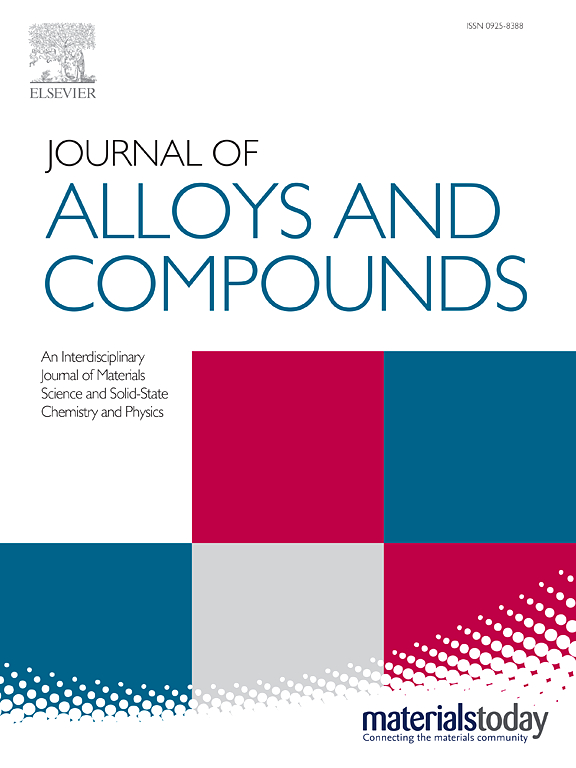充氢对单一FCC Al0.35CoCrFeNi高熵合金组织和力学性能的影响
IF 6.3
2区 材料科学
Q2 CHEMISTRY, PHYSICAL
引用次数: 0
摘要
研究了氢对Al0.35CoCrFeNi高熵合金室温力学行为的影响。采用真空感应熔炼和重力铸造工艺,在1250°С温度下进行三步热锻制备合金。在1330℃下热处理10 min,形成均匀的等轴晶结构,具有面心立方晶结构。样品在恒定的电流密度下进行电化学充电。充氢使屈服强度由210.8±3.2 MPa提高到218.8±1.3 MPa,抗拉强度由565.4±3.7 MPa降低到545±4.0 MPa,伸长率由71.2±1.9%降低到64.2±0.6%。测得的氢浓度为126±15 wt. ppm。拉伸测试后的断口分析表明,氢引起局部脆化,特别是在样品表面,高浓度的氢促进沿晶界的裂纹萌生。带氢和不带氢样品的加工硬化速率总体趋势相似,表明氢没有导致额外的硬化效应。所研究的Al0.35CoCrFeNi合金具有较好的抗氢脆性能,且氢浓度不会导致合金力学性能的严重退化。本文章由计算机程序翻译,如有差异,请以英文原文为准。
Influence of Hydrogen Charging on Microstructure and Mechanical Properties in a Single FCC Al0.35CoCrFeNi High-Entropy Alloy
The effect of hydrogen on the room-temperature mechanical behaviour of the Al0.35CoCrFeNi high-entropy alloy has been investigated. The studied alloy was prepared by vacuum induction melting and gravity casting, followed by three-step hot forging at a temperature of 1250 °С. Heat treatment at 1330 °C for 10 min resulted in a homogenized equiaxed grain structure with a face-centered cubic crystal structure. The samples were electrochemically charged at a constant current density. Hydrogen charging increased the yield strength from 210.8 ± 3.2 MPa to 218.8 ± 1.3 MPa, while reducing the ultimate tensile strength from 565.4 ± 3.7 MPa to 545 ± 4.0 MPa and elongation from 71.2 ± 1.9% to 64.2 ± 0.6%. The measured hydrogen concentration was 126 ± 15 wt. ppm. Fractography analyses after tensile testing revealed that hydrogen induces localized embrittlement, particularly at the sample surface, where high hydrogen concentrations promote crack initiation along grain boundaries. The work hardening rate of hydrogen-charged and uncharged samples exhibits similar overall trends, indicating that hydrogen does not lead to an additional hardening effect. The studied Al0.35CoCrFeNi alloy exhibits relatively good immunity to hydrogen embrittlement, and hydrogen concentration does not lead to severe degradation of mechanical properties.
求助全文
通过发布文献求助,成功后即可免费获取论文全文。
去求助
来源期刊

Journal of Alloys and Compounds
工程技术-材料科学:综合
CiteScore
11.10
自引率
14.50%
发文量
5146
审稿时长
67 days
期刊介绍:
The Journal of Alloys and Compounds is intended to serve as an international medium for the publication of work on solid materials comprising compounds as well as alloys. Its great strength lies in the diversity of discipline which it encompasses, drawing together results from materials science, solid-state chemistry and physics.
 求助内容:
求助内容: 应助结果提醒方式:
应助结果提醒方式:


